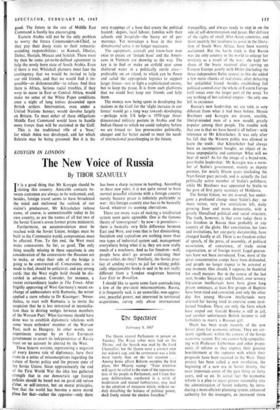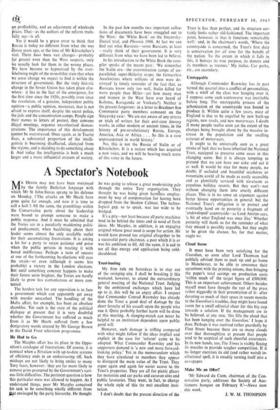The New Voice of Russia
KOSYGIN IN LONDON
By TIBOR SZAMUELY
Iis a good thing that Mr Kosygin should be 'visiting this country. Amicable contacts be- tween statesmen are always to be welcomed, and, besides, foreign travel seems to have broadened the mind and mellowed the outlook of our visitor's predecessor, Mr Khrushchev (whose name, of course, is unmentionable today in his own country, as are the names of all but two of the Soviet Union's seven former prime ministers).
Furthermore, an accommodation must be reached with the Soviet Union, bridges must be built to the Communist world, compromises must be effected. Fine. To this end, the West must make concessions. So far, so good. The only thing usually missing in these equations is any consideration of the concessions the Russians are to make, or what their side of the bridge is going to be constructed of. Concessions, one is made to feel, should be unilateral, and any strong cards that the West might hold should be dis- carded in advance. Consider, for instance, a recent extraordinary leader in The Times. After frigidly approving of West Germany's recent ex- change of ambassadors with Rumania, the writer applied a stern rebuke to Dr Kiesinger: 'Never- theless, to start with Rumania is to invite the suspicion that he is less interested in reconcilia- tion than in driving wedges between members of the Warsaw Pact.' What Germany should have done was to establish diplomatic relations with some 'more orthodox' member of the Warsaw Pact, such as Hungary. In other words, any impertinent attempt by an East European government to assert its independence of Russia must on no account be abetted by the West.
These bizarre notions, representing a negation of every known rule of diplomacy, have their roots in a series of misconceptions regarding the nature of Soviet policy and the present state of the Soviet Union. Since approximately the end of the First World War the idea has gathered strength that in our democratic age foreign policies should be based not on good-old raison d'etat, or self-interest, but on moral principles. Not that the world has become a more moral Place for that—rather the opposite—only there has been a sharp increase in humbug. According to these new rules, it is not quite moral to have normal peaceful relations with a foreign country merely because peace is infinitely preferable to war: this foreign country also has to be basically Good, whatever its seeming aberrations.
There are many ways of making a totalitarian system seem quite agreeable. One is the famous theory of 'convergence': by now—it postulates— there is basically very little difference between East and West, and even that is fast diminishing. Socialism and capitalism are nothing more than two types of industrial system and, management everywhere being what it is, they are now really much of a muchness. And as for freedom—well, people here don't go around criticising their bosses either, do they? Similarly, the Soviet prac- tice of sending writers to jail for writing politi- cally objectionable books is said to be not really different from a London magistrate banning Last Exit to Brooklyn.
I should like to quote some facts contradicting a few of the prevalent misconceptions. Russia, it is frequently said, is an unwarlike, non-aggres- sive, peaceful power, not interested in territorial acquisitions, caring only about international
tranquillity, and always ready to step in on the side of self-determination and peace. Her defence
of the rights of small Afro-Asian countries, and most recently her readiness to assist in the libera-
tion of South West Africa, have been warmly acclaimed. But the harsh truth is that Russia
was the only country in the world to enlarge her
territory as a result of the war: she kept her share of the booty received after carving up Eastern Europe jointly with Hitler (including the three independent Baltic states); to this she added a few more chunks of real estate, after defeating
her unfaithful friend--besides establishing full political control over the whole of Eastern Europe (still intact over the larger part of the area). To say nothing of her colonial empire—the only one left in existence.
Russia's new leadership, we are told, is very different from what it had been before. Messrs Brezhnev and Kosygin are decent, sensible, liberal-minded men of a new mould, greatly popular among their people. The trouble with
that one is that we have heard it all before—with reference to Mr Khrushchev. It was only after his fall that the Western public was allowed to learn the truth : that Khrushchev had always
been an incompetent bungler, an object of in-
tense unpopularity and contempt. What will we hear of next? As for the image of a brand-new, post-Stalin leadership: Mr Kosygin was a mem- ber of Stalin's government, mainly as deputy premier, for nearly fifteen years (including the Nazi-Soviet pact period), and is actually the last politically active member of Stalin's politburo; while Mr Brezhnev was appointed by Stalin to the post of first party secretary of Moldavia.
The Soviet Union, we are assured, has under- gone a profound change since Stalin's day: no more terror, very few restrictions left, daily growing freer and more democratic, with a greatly liberalised political and social structure. The truth, however, is that even today there is less freedom in Russia than probably in any country of the globe. Her constitution, her laws and institutions, her one-party dictatorship, have changed hardly at all. There is no freedom either of speech, of the press, of assembly, of political association, of conscience, of trade union organisation, or of foreign travel. Legal guaran- tees have not been introduced. True, most of the great concentration camps have been disbanded, and people no longer expect to be arrested at any moment. One should, I suppose, be thankful for small mercies. But in the course of the last year, besides Sinyaysky and Daniel, over seventy Ukrainian intellectuals have been given long prison sentences, at least five groups of Baptists have been tried and convicted, and only the other day five young Moscow intellectuals were arrested for having tried to exercise some intel- lectual freedom. These are only the facts which have seeped out. Gerald Brooke is still in jail, and another unfortunate British lecturer is still forbidden to marry a Russian girl.
Much has been made recently of the new Soviet plans for economic reform. They are cer- tainly significant, within the context of the Soviet economic system. Yet one cannot help sympathis- ing with Professor Lieberman and other propo- nents of reform as they express their genuine bewilderment at the raptures with which their proposals have been received in the West. Their project has been called a new revolution, the beginning of a new era in Soviet history, the most important event of the past thirty or forty years, and so on. In actual fact the economic reform is a plan to inject greater rationality into ' the administration of Soviet industry, by intro- ' ducing a more efficient planning system, enhanced ' authority for the managers, an increased stress
on profitability, and an adjustment of wholesale prices. That—as the authors of the reform truth- fully say—is all.
Yet it would be a grave error to think that Russia is today no different from what she was eleven years ago, at the time of Mr Khrushchev's visit. There have been vast changes—probably far greater even than the West suspects, only we usually look for them in the wrong places. We have become so hypnotised by the over- whelming might of the monolithic state that when we sense change we expect to find it within the structure of government. But the truly historic change in the Soviet Union has taken place else- where : it lies in the fact of the emergence, for the first time since the 1920s, possibly even since the revolution, of a genuine, independent public opinion—a public opinion, moreover, that is not afraid to express itself, despite the secret police, the jails and the concentration camps. People sign their names to letters of protest, they convene illegal meetings, organise unauthorised demon- strations. The importance of this development cannot be overstressed. Once again, as in Tsarist days, a substantial proportion of the intelli- gentsia is becoming disaffected, alienated from the regime, and is deciding to do something about It. And today the intelligentsia is both a much larger and a more influential stratum of society. In the past few months two important collec- tions of documents have been smuggled out to the West : the 'White Book' on the Sinyaysky- Daniel trial, and Phoenix 1966. At last we can find out what Russians—some Russians, at least —really think of their government. It is very different from what we have been led to believe.
In his introduction to the White Book the com- piler speaks of the recent past : 'We remember the Stalin era—the extermination camps of un- paralleled, super-Hitlerite scope; the furnaceless Auschwitzes where millions of men were de- stroyed' (a timely reminder of the fact that, as Russians know only too well, Stalin killed far more people than Hitler—yet how many men and women in the West have ever heard of Kolyma, Karaganda or Vorkuta?). Neither is the present forgotten : in a letter to Brezhnev five Communist party members comment on the Sinyaysky case : 'We are not aware of any arrests or trials of writers for their anti-state literary works, in either modern or ancient times, in the history of pre-revolutionary Russia, Europe, America, Asia or Africa . . . So this is a case unprecedented in world history.'
No, this is not the Russia of Stalin or of Khrushchev. It is a nation which has acquired a new voice, and we will be hearing much more of this voice in the future.



































 Previous page
Previous page